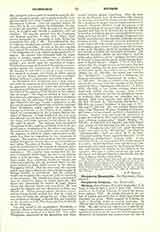

Niceron, JEAN-PIERRE, French lexicographer, h. in Paris, March 11, 1685, d. there, July 8, 1738. After his studies at the College Mazarin, he joined the Barnabites (August, 1702). He taught rhetoric in the college of Loches, and soon after at Montargis, where he remained ten years. While engaged in teaching, he made a thorough study of modern languages. In 1716 he went to Paris and devoted his time to literary work. His aim was to put together, in a logically arranged compendium, a series of biographical and bibliographical articles on the men who had distinguished themselves in literature and sciences since the time of the Renaissance. It required long research as well as great industry. After eleven years he published the first volume of his monumental work under the title of “Memoires pour servir a l’histoire des hommes illustres de la republique des lettres avec le catalogue raisonne de leurs ouvrages” (Paris, 1727). Thirty-eight volumes followed from 1728 to 1738. The last volume from his pen was published two years after the author’s death (Paris, 1740). Father Oudin, J.—B. Michauld, and Abbe Goujet later contributed three volumes to the collection. A German translation of it was published in 1747-1777. It has been often repeated that this work lacks method, and that the length of many articles is out of proportion to the value of the men to whom they are devoted. This criticism, however true it may be, does not impair the genuine qualities and importance of the whole work. Even now, these “Memoires” contain a great amount of information that could hardly be obtained elsewhere. Moreover, they refer to sources which, but for our author, would be easily overlooked or ignored. Besides this original composition, he translated various books from English, among which should be mentioned: “Le voyage de Jean Ovington a Surate et en divers autres lieux de l’Asie et de l’Afrique, avec l’histoire de la revolution arrivee dans le royaume de Golconde” (Paris, 1725); “La Conversion de l’Angleterre au Christianisme comparee avec sa pretendue reformation” (Paris, 1729).
Louis N. DELAMARRE.

